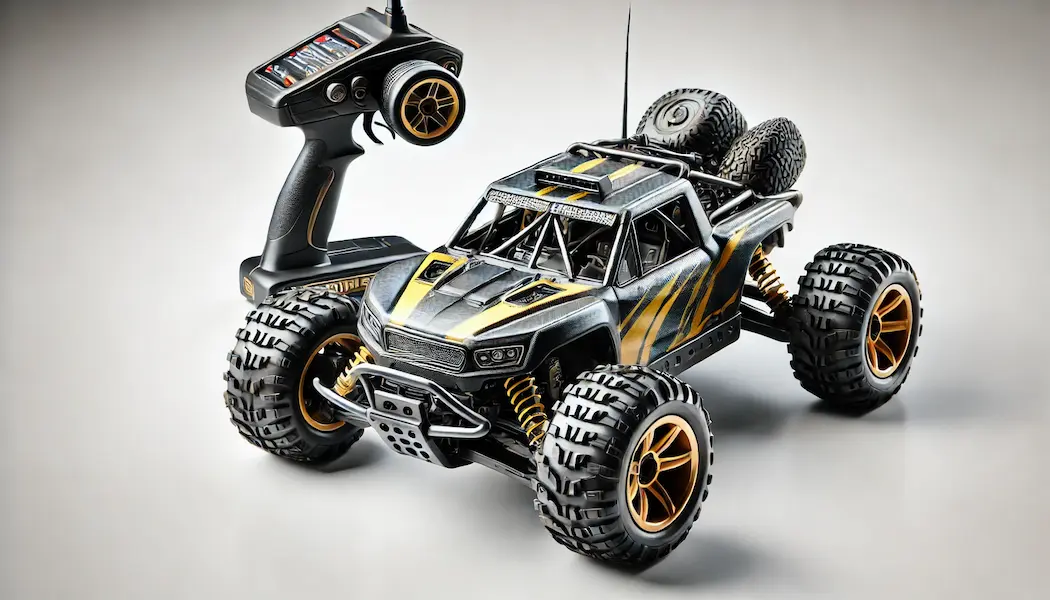The Ultimate Guide to RC Cars with Petrol Engines

Remote-controlled (RC) cars are an exciting hobby for people of all ages. With advancements in technology, these cars have become more sophisticated, offering different power sources like electric, nitro, and petrol. In this comprehensive guide, we’ll focus on RC cars with petrol engines, exploring their mechanics, benefits, drawbacks, and how they compare to other types of RC cars. Whether you’re a beginner or looking to expand your knowledge, this guide will help you make an informed decision.
Understanding Electric RC Cars
Electric RC cars are powered by rechargeable batteries, typically NiMH or LiPo. These cars are popular among beginners due to their ease of use and low maintenance requirements. Here are some key points about electric RC cars:
- Benefits:
- Low Maintenance: Electric RC cars require minimal upkeep compared to combustion engines.
- Quiet Operation: They produce very little noise, making them suitable for indoor and residential areas.
- Environmentally Friendly: Without the need for fuel, they are a cleaner option.
- Drawbacks:
- Limited Run Time: The run time is dependent on battery life, which may require frequent recharging.
- Charging Time: Recharging batteries can be time-consuming, interrupting play sessions.
Exploring Nitro RC Cars
Nitro RC cars use a fuel mixture of nitromethane, methanol, and oil, providing a powerful and thrilling driving experience. These cars are known for their speed and realistic engine sounds. Here’s a deeper look into nitro RC cars:
- Benefits:
- High Power Output: Nitro engines are capable of reaching high speeds, making them ideal for racing.
- Realistic Experience: The sound and smell of the nitro engine add to the excitement.
- Long Run Times: A full tank allows for 10-15 minutes of continuous running, and refueling is quick.
- Drawbacks:
- Maintenance Intensive: Regular maintenance is required, including cleaning the air filter, adjusting the carburetor, and replacing glow plugs.
- Noise and Smell: Nitro engines are loud and produce a distinct smell, which might not be suitable for all environments.
- Cost: Nitro fuel is expensive, and the ongoing costs can add up.
Delving into Petrol RC Cars
Petrol RC cars, also known as gas-powered RC cars, use a combination of unleaded petrol and 2-stroke oil. These cars are favored for their durability, longer run times, and lower maintenance compared to nitro cars. Let’s delve deeper into the specifics of RC cars with petrol engines:
- Benefits:
- Extended Run Time: Petrol RC cars can run for 40-50 minutes on a single tank, allowing for longer uninterrupted play.
- Less Maintenance: These cars require less frequent maintenance than nitro engines, making them easier to manage for beginners.
- Cheaper Fuel: Petrol is more affordable and widely available compared to nitro fuel.
- Drawbacks:
- Lower Speed and Power: Petrol RC cars are generally slower and less powerful than their nitro counterparts.
- Heavier Models: The larger size and weight can make them more challenging to control, especially for beginners.
- Noise Levels: Although quieter than nitro cars, petrol engines are still quite noisy.
Mechanics of Petrol RC Cars
Understanding the mechanics of petrol RC cars can help you appreciate their performance and maintenance needs. Here’s a detailed look at the key mechanical aspects:
- Ignition System:
- Petrol engines use spark plugs for ignition. The spark is generated automatically by magnets on the flywheel, eliminating the need for external igniters.
- Fuel System:
- Petrol RC cars use a mix of unleaded petrol and 2-stroke oil. This fuel is more economical and easier to obtain than nitro fuel.
Pros of Petrol RC Cars
Petrol RC cars offer several advantages that make them appealing to hobbyists. Here are the main benefits:
- Extended Run Time:
- Petrol RC cars can run for 40-50 minutes on a single tank, which is significantly longer than nitro or electric models.
- Cost-Effective Fuel:
- The fuel for petrol RC cars is cheaper and more readily available than nitro fuel, reducing ongoing costs.
- Durability and Reliability:
- Petrol engines are generally more durable and require less frequent maintenance, making them a reliable choice for extended play.
Cons of Petrol RC Cars
While petrol RC cars have many benefits, they also come with some drawbacks. Here are the main disadvantages:
- Lower Speed and Power:
- Compared to nitro RC cars, petrol models are generally slower and less powerful, which might be a downside for those seeking high-speed thrills.
- Heavier Models:
- The larger size and weight can make them harder to control, especially for beginners who are not yet skilled in handling RC cars.
- Noise Levels:
- Although not as loud as nitro cars, petrol engines still produce considerable noise, which might not be suitable for all environments.
Maintenance Tips for Petrol RC Cars
Proper maintenance is crucial to keep your petrol RC car running smoothly. Here are some essential tips:
- Regular Cleaning:
- Clean your car after each use to remove dirt and grime, especially around the engine area, to ensure optimal performance.
- Check Fuel Mixture:
- Always use the correct fuel mixture of petrol and 2-stroke oil to prevent engine damage and maintain performance.
- Inspect Spark Plugs:
- Regularly check and replace spark plugs to ensure efficient ignition and engine performance.
Choosing the Right RC Car
When deciding on the right RC car, consider your experience level, maintenance capabilities, and personal preferences. Here are some tips to help you make the right choice:
- Beginners:
- Start with electric RC cars for their ease of use and low maintenance. If you’re interested in combustion engines, petrol RC cars are a better choice due to their longer run times and lower maintenance.
- Experienced Hobbyists:
- Nitro RC cars offer high performance and excitement but require more maintenance. Petrol RC cars provide a good balance of performance and maintenance, ideal for longer play sessions.
Where to Drive Petrol RC Cars
RC cars with petrol engines offer a versatile driving experience, suitable for various terrains. However, it’s important to choose the right location to ensure safety and maximize enjoyment.
- Private Property:
- The best place to drive your petrol RC car is on private property. This includes your backyard, private parking lots, or open fields. Make sure to have permission if it’s not your own property.
- Off-Road Areas:
- Petrol RC cars perform well on off-road terrains like dirt paths, forest trails, and grassy fields. These cars can handle rough surfaces better due to their robust build.
- Smooth Surfaces:
- While petrol RC cars can drive on smooth surfaces, it’s more fun to use them in areas with slight obstacles. Avoid public roads to ensure safety and follow local regulations.
Types of Petrol RC Cars
Petrol RC cars come in various types and scales, each suited for different uses and preferences. Here are some common types:
- Buggies:
- Designed for off-road racing, buggies have a sturdy build and can handle rough terrains. They are great for dirt tracks and hilly landscapes.
- Monster Trucks:
- These are larger and more powerful, perfect for tackling difficult terrains. Monster trucks are slower but can overcome obstacles like rocks and uneven ground.
- On-Road Cars:
- Ideal for smooth and flat surfaces, on-road cars are built for speed. They are not suited for rough terrains but excel on paved tracks and roads.
Selecting the Right Scale
The scale of an RC car indicates its size compared to the real vehicle. For beginners, it’s important to choose a manageable scale:
- 1:10 Scale:
- These are smaller, lighter, and easier to control. They are perfect for beginners and are usually less expensive.
- 1:8 Scale:
- Slightly larger and more powerful, these cars offer a balance between performance and control. They are suitable for those with some experience.
- 1:5 Scale:
- These are large, powerful, and often more expensive. They provide a thrilling experience but are better suited for experienced hobbyists due to their size and complexity.
RC Gasoline vs. RC Nitro Cars
Understanding the differences between gasoline and nitro RC cars can help you decide which one suits your needs better:
| Feature | Gasoline RC Cars | Nitro RC Cars |
|---|---|---|
| Fuel Type | Unleaded petrol and 2-stroke oil | Nitro fuel (nitromethane, methanol, oil) |
| Running Time | 40-50 minutes per tank | 10-15 minutes per tank |
| Maintenance | Less frequent, easier to manage | More frequent, complex |
| Cost | Cheaper fuel, higher initial cost | Expensive fuel, lower initial cost |
| Performance | Slower, more stable | Faster, more powerful |
| Noise | Loud but less noisy than nitro | Very loud and realistic |
Tips for Beginners with Petrol RC Cars
Starting with petrol RC cars can be exciting but challenging. Here are some tips to make your experience smoother:
- Start Slow:
- Begin at low speeds to get a feel for the car’s handling. Gradually increase the speed as you become more comfortable.
- Practice in Open Spaces:
- Choose a large, open area free of obstacles. This will give you plenty of space to practice and reduce the risk of collisions.
- Learn Basic Maintenance:
- Familiarize yourself with basic maintenance tasks like cleaning the air filter, checking the fuel mixture, and inspecting the spark plug. Regular maintenance will keep your car running smoothly.
Essential Accessories for Petrol RC Cars
To enhance your petrol RC car experience, consider investing in some essential accessories:
- Spare Parts:
- Keep spare parts like spark plugs, air filters, and fuel on hand. These will help you quickly replace worn-out components and keep your car in top condition.
- Tool Kit:
- A basic tool kit with screwdrivers, wrenches, and pliers is essential for performing maintenance and repairs.
- Fuel and Oil:
- Always have a supply of unleaded petrol and 2-stroke oil. This ensures you’re ready for long play sessions without interruption.
Common Issues and Troubleshooting
Petrol RC cars, like any mechanical device, can encounter issues. Here are some common problems and how to troubleshoot them:
- Engine Won’t Start:
- Check the spark plug and fuel mixture. Ensure the fuel is fresh and properly mixed.
- Poor Performance:
- Clean the air filter and check for blockages. Inspect the fuel lines for leaks or clogs.
- Overheating:
- Ensure proper ventilation and avoid running the car continuously for long periods. Let the engine cool down between runs.
Safety Tips for Using Petrol RC Cars
Safety should always be a priority when using petrol RC cars. Follow these tips to ensure a safe and enjoyable experience:
- Wear Protective Gear:
- Always wear safety goggles and gloves to protect yourself from fuel and debris.
- Keep a Safe Distance:
- Maintain a safe distance from the car while it’s running. Keep spectators at a safe distance as well.
- Avoid Flammable Areas:
- Do not operate your petrol RC car near flammable materials or in areas prone to fire hazards.
Conclusion
Choosing the right RC car can greatly enhance your hobby experience. RC cars with petrol engines offer a unique blend of durability, longer run times, and realistic driving experiences. While they may require a bit more maintenance and investment, the rewards are worth it for those seeking a thrilling and engaging hobby. Whether you’re a beginner or an experienced hobbyist, understanding the mechanics, benefits, and considerations of petrol RC cars will help you make an informed decision and enjoy endless hours of fun.
Investing in a petrol RC car means committing to regular maintenance and proper handling, but it also means enjoying a robust and long-lasting vehicle. Take your time to research and choose a model that fits your needs and preferences. Happy driving!
Read also: The Ultimate Guide to Engine Oil for Cars with High Mileage
Thanks for checking out this article on EngineEcho.com! Hope you found this article: "The Ultimate Guide to RC Cars with Petrol Engines" helpful! If you liked it and want to dive into more car engine topics, head over to our homepage. There's always something new to discover in the world of engines. Enjoy your reading journey!
Check out our previous article: The Ultimate Guide to Engine Oil for Cars with High Mileage






